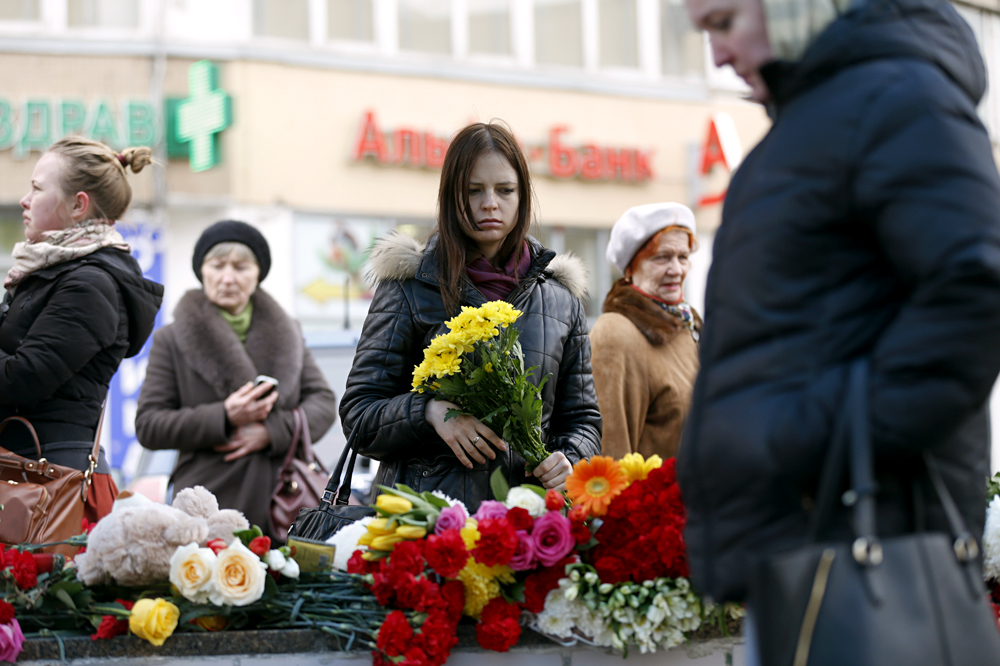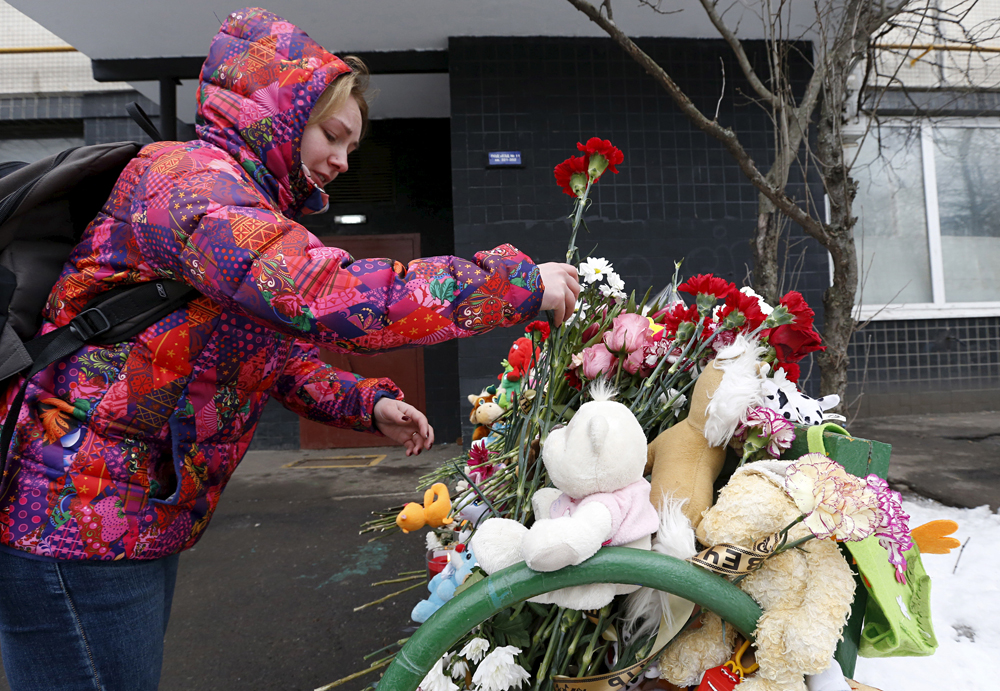
People lay flowers near the Oktyabrskoye Polye station in Moscow.
EPAThe exit of the Oktyabrskoye Polye metro station in northwest Moscow is crowded with people. This is the place where, on the morning of February 29, a woman dressed in black held up the severed head of a four-year girl, shouted "Allahuakbar!" and threatened to blow herself up. She was detained by police, who did not find any explosives.
The spot where Uzbek national Gulchekhra Bobokulova was detained by police has turned into a spontaneous shrine.
Muscovites bring flowers and children's toys to honor the memory of the murdered child. People passing by stop and stare at the growing collection of flowers. They take off their hats; some make the sign of the cross.
Olga, a blonde middle-aged woman, adds two carnations to the shrine. Her eyes are filled with tears.
"I was simply terrified, I have a child myself," she said as she began to cry. "I cannot imagine what made that woman do such a thing."
Near Olga, an elderly man explains to his companion: "It is a forbidden topic for discussion; nothing was shown on television."
Another man utters an obscenity as he passes by and speeds up his step.
The crime committed by Bobokulova has shocked all of Russia. The decapitated body of the child was found in an apartment on Narodnogo Opolchenia street, where the woman started a fire.
 A woman brings flowers to commemorate the murdered child outside a residential building, where the child together with family members lived, in Moscow, March 1, 2016. Source: Reuters
A woman brings flowers to commemorate the murdered child outside a residential building, where the child together with family members lived, in Moscow, March 1, 2016. Source: Reuters
According to Russian media, the girl's parents had no complaints about Bobokulova’s work; she was the girl’s nanny for about three years and had practically become a member of the family.
Bobokulova, who is now in custody, confessed to the crime and participated in a reenactment of the crime.
Russian society reacted strongly to the tragedy. People were particularly outraged that all major television channels failed to cover the incident. Kremlin spokesman Dmitry Peskov said the authorities did not consult with television channels, but supported their decision.
Public attention was also attracted by the bizarre behavior of the woman, who, according to Viktor Ivanov, the head of the Russian Federal Drug Control Service, could have been under the influence of drugs.
Bobokulova worked in Moscow without a license. To obtain it, migrants need to be checked against the databases of law enforcement agencies and pass a drug test as well asa psychiatric examination, which many believe, could have helped in avoiding this tragedy.
In connection with this, Vladimir Gutenyov, the first deputy chairman of the State Duma Committee for Industry, asked the Federal Migration Service (FMS) to check the compliance of nanny recruiting agencies against the laws concerning the employment of migrants.
Boris Altshuler, president of the non-governmental organization, Right of the Child, is also confident about the need for a special certification for nannies.
"This is an unregulated market, which requires an independent quality control," Altshuler told RBTH.
According to Islamic scholar Rais Suleimanov, the authorities will attempt to attribute the crime to Bobokulova's drug intoxication or psychological instability in order to avoid provoking anti-Islamic sentiment in society.
"This will have the opposite effect," Suleimanov believes."The desire to conceal the religious and ideological subtext will only convince the average Russian of its existence."
Suleimanov says that the ideological motive cannot be excluded, since radical Islamists are the ones that began the practice of beheadings in order to terrorize people.
"Cutting off the head became a symbol for ISIS supporters, which is supposed to make the enemy tremble," says the scholar."It is significant that the woman committed the crime at home, but went to the street to show what she had done, shouting threats at passersby as if boasting of her deed."
Damir Mukhetdinov, the deputy chairman of the Muslim Spiritual Board of Russia, on the contrary, believes that Bobokulova's actions should not be considered from the point of view of Islam.
"Even if we assume that she shares the views of extremists, she cannot claim to have any relationship to Islamic culture," Mukhetdinov told RBTH. "The chapter on jihad of any book on Islamic law says that the war is not waged against children, women or elderly people."
While terrorists and people who commit crimes under the guise of Islam put themselves outside of Islamic law, "they will be punished according to Sharia," says Mukhetdinov.
All rights reserved by Rossiyskaya Gazeta.
Subscribe
to our newsletter!
Get the week's best stories straight to your inbox